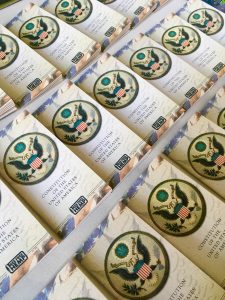
The HIA has challenged Drug Enforcement Administration in federal court in three landmark cases (now four!) in defense of the hemp industry in the United States.

2001 – 2004
“(DEA) cannot regulate naturally-occurring THC not contained within or derived from marijuana -i.e. non-psychoactive hemp is not included in Schedule I. The DEA has no authority to regulate drugs that are not scheduled, and it has not followed procedures required to schedule a substance.”
In October of 2001, the DEA announced via press release an interpretive rule that banned hemp seed and hemp oil food products which contained any amount of trace THC. In response to this capricious and unreasonable action, taken without compelling reason and without allowing for the statutorily-mandated public comment period, the Hemp Industries Association (HIA) and several other plaintiffs filed an “Urgent Motion for Stay” to prevent the rule taking effect. In March of 2002 the United States Court of Appeals for the Ninth Circuit granted the motion, and the trade of hemp foods was able to continue while the case would be litigated. The unreasonableness of the DEA’s rules, the unequal treatment of hemp when compared to similarly non-intoxicating food products like poppy seeds, and the intolerable burden they placed on the domestic hemp industries, made clear the pressing need for legal action as a remedy.
Despite overwhelming opposition and the ongoing litigation, in March of 2003 the DEA continued to publish new rules attempting to criminalize the possession and sale of hemp seed oil and hemp food products containing trace amounts of THC.
They also published a rule that would have effectively destroyed the U.S. hemp body care and hemp fiber industries (under the guise of exempting them from supervision) by banning the import of the hemp seed oil required to make their products.
On March 28, 2003, the Hemp Industries Association, several hemp food and body care companies, and the Organic Consumers Association filed an urgent motion for stay in the 9th Circuit Court of Appeals to stop this.
In February, 2004 the Ninth Circuit issued a unanimous decision in favor of the HIA, in which Judge Betty Fletcher wrote, “[T]hey (DEA) cannot regulate naturally-occurring THC not contained within or derived from marijuana-i.e. non-psychoactive hemp is not included in Schedule I. The DEA has no authority to regulate drugs that are not scheduled, and it has not followed procedures required to schedule a substance. The DEA’s definition of “THC” contravenes the unambiguously expressed intent of Congress in the Controlled Substances Act (CSA) and cannot be upheld”.
When the DEA declined to appeal this ruling to the Supreme Court in September of 2004, the HIA and its allies were victorious, and the continued growth and success of the hemp industries in the United States was assured.
In December 2016, the DEA published a rule establishing a drug code for “any extracts from the genus cannabis plant containing any cannabinoid” —attempting to schedule CBD under the Controlled Substances Act, skipping the formal scheduling action to determine if it satisfied the statutory requirements for their control altogether. The DEA’s decision posed a significant threat to hemp producers and consumers in the U.S., and local law enforcement in some states began to seize the property of and shut down lawful CBD businesses, resulting in a major chilling effect.

The designation of CBD as a Schedule 1 substance, furthermore, was a clear violation of its own requirements for scheduling, which state that the substance must have no accepted medical use. The DEA, for its part, maintained that the creation of this new drug code was intended to allow them to conduct more precise reporting and accounting and that, since it did not add a substance to the schedules that was not already controlled, the rule was not a scheduling action.

2016 – 2018
“Congress legalized … any commercial marketing of industrial hemp extracts and derivatives, so long as the products fell under the THC threshold level.”
In April of 2018, the court sidestepped the issue by ruling against the petitioners on procedural grounds. Because the HIA and other plaintiffs had not submitted a public comment during the designated period on this question, which was six years prior to the DEA’s new rule, they found that the plaintiffs lacked standing. Despite the setback, the case and subsequent actions were fundamental to the eventual legalization of industrial hemp in the 2018 Farm Bill. |

2017
“Thirteen years ago DEA was told in no uncertain terms by the U.S. Court of Appeals that Congress had made it’s intent clear: DEA has no power to regulate hemp seed and oil, and the hemp food and beverage products made from them. It is disappointing that the industry has to revisit the issue and take this step to compel DEA to obey the law."
In February, 2017 the HIA took action to hold the DEA in contempt of court for violating the 13-year-old court order that prohibits the administration from regulating hemp food products as Schedule I controlled substances.

The HIA sought to hold the administration in contempt for violating the 2004 Ninth Circuit’s ruling and argued that the DEA’s actions violated both the Congressional intent of the 2014 Farm Bill and the Consolidated Appropriations Act of 2016.
In 2018, as part of a negotiated settlement with the HIA, the Drug Enforcement Administration “clarified” its rule to affirm that the it had no authority over products derived from the hemp plant, regardless of its cannabinoid content. This negotiated settlement with the DEA cleared the way for the hemp foods industry to flourish in the United States.
Vote Hemp’s history of hemp legal cases